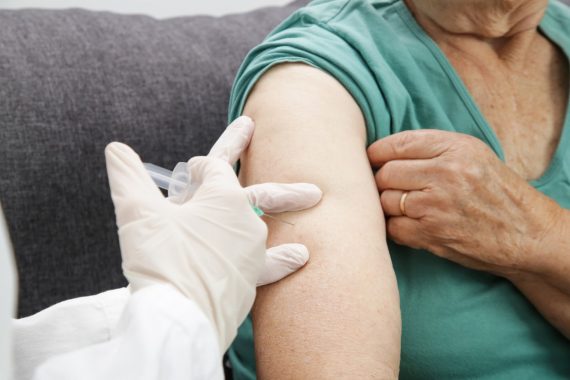Single vaccine shot reduces care home Covid infections by 62%

A single dose of either vaccine prevents 62% of Covid infections among care home residents, a University College London (UCL) study has found.
The study of more than 10,000 care home residents in England – with an average age of 86 – showed that one dose of either the Pfizer or AstraZeneca vaccine gave ‘substantial protection’ of 56% after four weeks, rising to 62% after five.
The DHSC-funded study, which is yet to be peer-reviewed, compared the number of PCR test-confirmed infections among vaccinated and unvaccinated groups between December and mid-March.
And evidence from lab samples of positive PCR tests suggests infections occurring post-vaccination could be ‘less infectious’, with samples taken at least 28 days after the first dose containing ‘less of the virus’, UCL said.
A single vaccine dose ‘appeared to have little impact’ among those with prior Covid infection, but only 11% of study participants had been infected so further research is needed, it added.
However, the timing and extent of protection was ‘similar’ for both vaccines, UCL said.
Study lead Dr Laura Shallcross said: ‘Our findings show that a single dose has a protective effect that persists from four weeks to at least seven weeks after vaccination.
‘Vaccination reduces the total number of people who get infected, and analysis of lab samples suggests that care home residents who are infected after having the vaccine may also be less likely to transmit the virus.’
She added: ‘We can also infer that the vaccines protect against the highly transmissible UK variant, as this was prevalent during the study period.’
Dr Maddie Shrotri, from the UCL Institute of Health Informatics, said: ‘Our study suggests that both vaccines currently in use in the UK are effective at reducing infections in frail, older adults. This new evidence is important because there is currently limited data about vaccine efficacy for this vulnerable population.’
It comes as another Government-funded study has shown that one shot of the Pfizer vaccine generates a ‘robust’ immune response in 99% of recipients – with ‘even stronger’ protection following a second dose given after 23 days – the DHSC announced.
The study, led by Sheffield and Oxford Universities and published as a pre-print in the Lancet, tested blood samples from 237 healthcare workers between 9 December and 9 February for antibody and T cell responses following vaccination with the Pfizer jab.
It also found that one dose of the vaccine caused a stronger immune response among those who had previously been infected with Covid-19 compared with those who had not had the virus.
Antibody responses were 6.8 times higher 28 days after the jab among those with previous infection and T cell responses 5.9 times higher, it said.
The study also found:
- Immune response after one dose among those who had not had Covid was at a ‘similar or higher level’ compared with the previously infected but unvaccinated.
- And T cell response was ‘as strong’ in those who received two doses without prior infection as those who had been infected and had just one dose.
This shows that the Pfizer vaccine ‘provides better protection and an enhanced immune response to Covid-19 than the immune response from natural infection’, the DHSC said.
However, it remains ‘vital’ to get a second dose of vaccine as it is not yet known how long antibody and T cell response last following infection, it added.
Dr Thushan de Silva, study author from the University of Sheffield, said: ‘Our results demonstrate that T cell and antibody responses induced by natural infection are boosted significantly by a single dose of vaccine.
‘While the response to a single dose was lower in infection-naïve individuals, it was still equivalent or better than the immunity in previously infected individuals before it is boosted by vaccination.’
Professor Susanna Dunachie, study lead from the University of Oxford, added: ‘Interestingly, we also found that vaccination improves the breadth of T cell responses generated in previously infected individuals.
‘In immunology, this is a good thing as it means that you are more likely to maintain protection against new mutations of the virus, and further work will assess how long these vaccine responses last.’
The study found no link between age and levels of immune response, the DHSC said.
Previously, a Public Health England analysis of real-world data from the vaccine rollout in England showed that a single dose of the Oxford vaccine is as effective as the Pfizer jab in reducing the risk of hospitalisation in those aged over 80.
And the first UK study into the transmission of coronavirus following vaccination found that the chances of healthcare workers passing Covid onto others reduced by at least 30% after one vaccine dose.
It comes as the Government is considering making Covid-19 vaccinations mandatory for those who care for the most vulnerable patients.
Pulse October survey
Take our July 2025 survey to potentially win £1.000 worth of tokens

Visit Pulse Reference for details on 140 symptoms, including easily searchable symptoms and categories, offering you a free platform to check symptoms and receive potential diagnoses during consultations.












